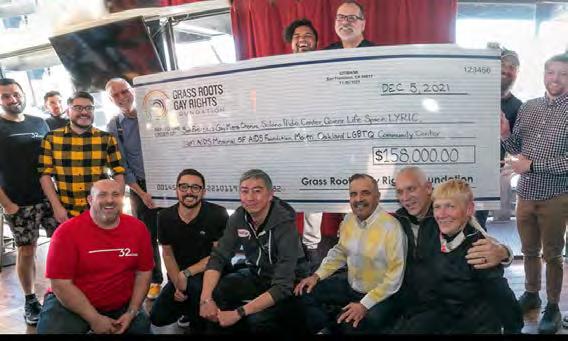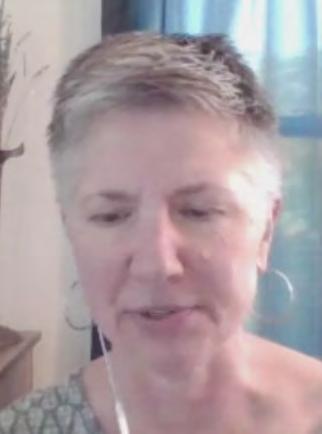
10 minute read
See
This year’s benefitting organizations were the San Francisco Gay Men’s Chorus, Solano Pride Center, Queer LifeSpace, Lavender Youth Recreation and Information Center, National AIDS Memorial Grove, Oakland LGBTQ Community Center, the San Francisco AIDS Foundation, and Maitri Compassionate Care.
“What a year! It’s been an honor and pleasure to be the events chair for 2020 and 2021,” stated Miguel Jimenez. “I’m so glad that this year we are able to have this check celebration in person. We had many touch and go moments due to COVID, however, we were still able to have a great season of events this year.”
Will Vitagliano, incoming event chair for next year’s REAL BAD 33 and RITUAL parties, said, “I am excited to return, after what I thought was going to be a one-year hiatus, to this amazing organization that has been so near and dear to my heart. I am beyond excited to welcome back some seasoned veterans to the events committee and enthusiastic to welcome some talented new team members for an unforgettable season of events.”
For more information, go to https://www.realbad.org/

Courtesy GRGR Foundation The Grass Roots Gay Rights Foundation donated $158,000 to several LGBTQ nonprofits in 2021.
‘Sexy elf’ to be chosen at Castro block party
The Castro Merchants Association will crown a “sexy elf” during its Winter Wonderland block party Sunday, December 19, at Noe Street between Market and Beaver streets.
The sexiest elf contest is slated to begin at 4 p.m. and has a $1,000 grand prize. A news release noted that organizers are “looking for the sexiest elves in San Francisco to join us on stage and convince our celebrity panel of judges why they should be crowned sexiest elf in the city.”
Men and women are encouraged to participate, the release states. To learn more and register, go to https://bit. ly/3m27fs6
The Winter Wonderland has activities for kids from 11 a.m. to 2 p.m. including free photos with Santa Claus, a petting zoo, drag queen storytime, and a holiday art mart, which runs the duration of the afternoon.
Events for all ages from 2 to 5 p.m. include the aforementioned contest, drag performances, music, and entertainment.
A landmark comprehensive national community survey of LGBTQ+ women who center and partner with women has compiled data from more than 5,000 participants and hopes to gather more data as it has extended the deadline for people to participate.
According to a news release, Justice Work, a think tank, is conducting the study. The senior researcher on the project is Alyasah Ali Sewell, Ph.D., a sociology professor at Emory University.
“We are striving to have not just the largest repository of current community data on womxn and nonbinary people who partner with womxn, but the most ethnoracially and economically diverse data as well,” Sewell stated.
Urvashi Vaid, director of Justice Work, stated, “This survey’s findings will help our movement develop organizing, advocacy, policy ideas, services, and support for queer womxn who partner with other womxn.”
The release noted that the study is supported by a group of veteran activists and researchers that include Minneapolis Councilmember Andrea Jenkins; First Nations Collective Founder Coya White Hat-Artichoker; University of Chicago Professor and founder of the Black Youth Project, Cathy Cohen, Ph.D.; Dean Spade, Seattle University Law School professor, trans scholar and activist, and founder of the Sylvia Rivera Law Project; and Bianca Wilson, Ph.D., and Lee Badgett at the Williams Institute at UCLA School of Law.
A diverse mix of grassroots organizations including leading LGBTQ community centers around the country, and key national partners like National Center for Lesbian Rights, the National LGBTQ Task Force, social media influencers, and promoters and media partners like Rivendell Media are supporting the project to reach out to queer communities nationwide. COVID-19 restrictions have made it difficult for the study team to mount in-person events to support participation in the survey, the release states, but the team is planning opportunities to connect in-person in early 2022.
To take the survey, go to https:// www.lgbtqwomensurvey.org/. The deadline is March 31. t
<< Blackberri From page 1
time,” Joe Hawkins, executive director of the Oakland LGBTQ Community Center, wrote on Facebook. “After we signed the lease to open the Oakland LGBTQ Community Center, he came to energetically clear our space with sage. After he finished, he gave me a card with Ochún the Orichá of love on it that I keep on a bookshelf in my office.
“Thank you for all the love and joy that you have given to our community here in Oakland and to the world,” Hawkins added. “You will be remembered always.”
“Tongues Untied,” the 1989 Black queer film by Marlon Riggs, contained music by Blackberri. He told the Bay Area Reporter in a July interview that his work appeared in other films and that music of his has been archived at the Smithsonian.
“I have music in Peter Adair’s film ‘Word is Out,’ [and] in the film ‘Looking for Langston,’” he said.
The context of that July interview was that Blackberri received an award from The Barony, a 501(c)(3) nonprofit based in the East Bay that raises funds for charities within Alameda, Contra Costa, and Santa Clara counties. (https://www.ebar.com/news/ news//306732) However, the award had the wrong name for him. On Facebook, Blackberri was forced to use the moniker “Blackberri Singer,” and that’s what organizers had originally put on his award.
“Blackberri Singer is not my name,” Blackberri told the B.A.R. “I had to choose it because Facebook didn’t let me use one name.”
In 2015, Sister Roma of the Sisters of Perpetual Indulgence and others met with Facebook officials to discuss the issue. Facebook officials promised that they would make it easier for users to provide the company with more information about themselves so that the names they are commonly known by could be used on their profiles.
But some fell through the cracks, as Blackberri did. Singer was chosen as his last name on his Facebook profile because it is what he does for a living.
“I took my passport, my credit card, and everything,” Blackberri said. “They have one name on them. So they realized that I had one name, and they said they would drop ‘Singer’ and just let me use the one name, but they never did.”
Organizers of The Barony corrected the mistake and apologized.
In 1981, Blackberri released “Blackberri and Friends: Finally” on his music label, Bea B. Queen. It included the song “Eat the Rich.” He performed at LGBTQ festivals and open mics for many years. He was also active in the fight against HIV/AIDS. He received awards for his work and music.
Blackberri was born May 31, 1945, according to his Facebook page.
In 2017, Blackberri was a recipient of the Audrey Joseph Entertainment Award from San Francisco Pride
“Blackberri and his entire care team (there are at least 14 of us + dozens of medical caregivers) send prayers and love to all who know Blackberri as a beloved extended + blood family member,” Folkz wrote. “None of us did this alone. We ask for patience as we will reach out for support in the days to come. More information regarding Blackberri’s remembrance and rejoice circles will be forthcoming.” t
<< Political Notebook From page 5
In 2013, McLeod-Skinner enrolled in law school at the University of Oregon, graduating in 2016. The mother of four had first moved to southern Oregon as a child. Her wife, Cass Skinner, comes from a multi-generational ranching family in eastern Oregon’s Jordan Valley.
During her first congressional race, McLeod-Skinner pitched herself as a “rural Democrat” and garnered local media attention for traveling around the district with her 2-year-old Doberman, Moshi, riding along in her blue Jeep Wrangler. (A photo of her leaning against the vehicle with Moshi in the driver’s seat was included in an October 27 email from McLeod-Skinner teasing her 2022 electoral announcement.)
Schrader is a farmer and had worked as a veterinarian for more than 30 years before entering Congress. He is among the 19 members of the Blue Dog Coalition, a caucus in the House of Representatives of centrist or right-leaning Democrats.
He had questioned certain aspects of the Build Back Better Act, a cornerstone of President Joe Biden’s agenda, but ended up voting for it in the end.
Nonetheless, his publicly debating the price tag for the social and climate policy initiatives included in the legislation has given McLeod-Skinner an opening to criticize his positions.
“He is a very unpopular Blue Dog Dem who has been undermining Biden’s agenda,” she told the B.A.R.
Between January and June of this year McLeod-Skinner had served as interim city manager in Talent, overseeing its recovery from a wildfire that tore through it over Labor Day weekend last year. She decided to run again for Congress because of the impact she could have in the House on her three top priorities of addressing climate change, helping working-class families rebound from the COVID-19 pandemic, and establishing good governance.
“Ultimately, this is an opportunity for folks across Oregon and across the country to support a healthier, more functional Congress,” McLeodSkinner said of the 2022 midterm elections. “Literally, your democracy is under attack.”
Pointing to her vote margins in past races, McLeod-Skinner argued she does have a path to survive her party primary in the spring and win the seat in November. She expects to make a swing through the Bay Area sometime early next year to help raise funds for her campaign.
“If folks can contribute and help us make this happen, it is really exciting. This is a completely winnable race,” she said. “Getting help from friends back in the Bay Area to make this happen would be greatly appreciated.”
Easton also expects to hold a fundraiser in the Bay Area sometime early next year. He is aiming to raise $740,000 just for his primary race and has been hosting virtual events where he shows off his Italian cooking skills while answering questions from participants.
“I am in this to win. I think I can win,” said Easton. “It will be a mad dash from March to May. I do need to raise money to be viable to get my message out.” t
<< Safe drug site From page 7

Peskin blasted Breed, saying his constituents “feel abandoned by the city,” which he characterized as being “more interested in press releases” than in solving problems.
“You cannot say the city doesn’t intend to use this as a safe injection site when the city does intend to use this as a safe-injection site,” Peskin said. “It’s not true on its face.”
Peskin’s concerns were not heeded, and the amendment and purchase passed 10-1.
Haney, a straight ally, is currently running for state Assembly, where if he wins the February 15 race he’ll be representing much of the city’s eastside. His opponents are David Campos, a gay man who is currently on leave as chief of staff to San Francisco District Attorney Chesa Boudin; Thea Selby, a straight ally who is a City College of San Francisco trustee; and Bilal Mahmood, a straight ally who is a former Obama administration official.
Following the board’s vote Selby stated to the B.A.R., “I support safe consumption sites. We need to do everything we can, including prosecuting drug dealers, to make a safer San Francisco. We all deserve to be safe.”
Campos and Mahmood did not respond to requests for comment.
Breed’s communications director, Jeff Cretan, stated to the B.A.R. that the process had to be fast so that the city didn’t miss out on the opportunity to purchase the building.
“This is an important opportunity to acquire a site for behavioral health uses for people suffering from mental illness and addiction to get off the street and connected to services,” Cretan stated. “The board has made clear their desire that we treat the rise of overdoses and suffering as an emergency, and the Mayor agrees it requires urgent action.” t
Former LYRIC ED honored

The San Francisco Board of Supervisors passed a resolution December 14 designating December 30 as “Jodi Schwartz LYRIC Day” in the city. Schwartz, a queer woman, is the former executive director of the Lavender Youth Recreation and Information Center, better known as LYRIC, and is now leading the organization’s $2.5 million capital campaign to complete a major renovation of its “Purple House” on Collingwood Street in the Castro. “I’m proud of LYRIC,” Schwartz said during virtual remarks. During her tenure, she said, the nonprofit prioritized youth, with the emergence of a new generation of leaders. LYRIC’s budget has grown to over $4 million, she noted, and it has a dedicated staff of over 30 people. Schwartz thanked gay District 8 Supervisor Rafael Mandelman, who authored the resolution, and co-sponsors board President Shamann Walton and Supervisors Hillary Ronen, Myrna Melgar, Aaron Peskin, Dean Preston, and Gordon Mar. She also gave a shout-out to Carolyn, her wife of almost 30 years.



